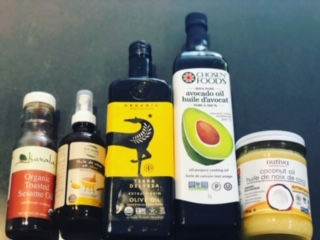
Not all oils are created equal!
There is much confusion about which oils to use.
Some clarification about a few popular ones:
Coconut Oil:
90% saturated fat (vs butter’s 64%, beef 40%, lard 40%; 12 grams per 1 tablespoon ) which can raise LDL cholesterol levels (raises risk of heart disease). However, coconut oil also boosts HDL cholesterol due to its Laurie acid (12-carbon atoms saturated fat). Additionally plant based oil contains antioxidants.
Avocado Oil:
less saturated fat (only 1.6 grams per tablespoon), packed with heart-healthy monounsaturated fats, and has a high smoke point of 375 to 400 degrees F. Boasts a neutral flavor without chemical processing like refined canola and vegetable oil. Biggest downside is cost.
Walnut oil:
pressed from walnuts, boasts a rich, nutty taste and a smoke point of 320 degrees F. High in ALA and boasts ellagic acid (anti cancer); source of nutrients including B vitamins, E, selenium, iron, calcium. Thought to stabilize hormone levels. Flavor and texture lends itself for low heat use such as baking, marinades, dressings, and as a garnish.
Extra Virgin Olive Oil:
Extra virgin olive oil is plant based and cold pressed. Contains antioxidants called polyphenols, plant compounds that improve heart health.
Sesame oil:
highly flavourful and cold pressed (rather than chemically processed). However has a low smoke point (350 to 410 degrees F) which renders this oil ideal for sautéing and finishing dishes rather than frying. Use in moderation because has higher omega 6 content than other oils.
Flaxseed oil:
High in omega 3 fatty acids which the body cannot synthesize but needs for decreasing inflammation, cholesterol balance, and increasing production of prostaglandins, lipid-like compounds that protect the body. However, sensitive to heat and oxidizes quickly (hence the dark bottles) so buy small bottles and store in cool dark places and use as a drizzle or dressing.
Grape Seed oil:
High in Vitamin E and antioxidants, derived from grapes. Reduces systemic redness and improves insulin resistance. Cold pressed.
Tips:
Skip trans fats! Trans fat (aka partially hydrogenated) raises bad cholesterol, lowers good cholesterol, and boosts inflammation. Avoid!
Partially hydrogenated are extracted from plants with industrial chemicals such as hexane. Cold pressed means extracted mechanically from the plant or seed using pressure. Lastly, refined oils reduces nutritional value and withstands heat.
Canola and vegetable oil have been chemically processed which depletes the natural mineral content. Not recommended. Processed with toxic solvents like Hexane.
Avoid peanut oil, containing aflatoxins and omega 6 which causes inflammation. Also prone to oxidation, which means quick rancidity without you knowing. High risk too of atherogenicity, due to high levels of lectins, meaning hardening of the arteries.
Look for glass, not plastic, bottles! Glass should be dark coloured to avoid oxidation. Plastic can leach chemicals and is environmentally unfriendly.
Heat and light generate free radicals that degrade oil’s taste and quality and effects on your health.
Use oils with high smoke points such as avocado and almond oil for cooking at high heat whereas easily oxidized oils such as flax should be reserved for drizzling or dressing!
Aim for a ratio of one omega-3 for every two omega-6s. Having a higher ratio of omega 6 causes inflammation. Having enough omega 3 helps with vitamin absorption, energy storage, and controlling inflammation.
Store oils in the fridge where they will be kept dark and cool.

Comentarios